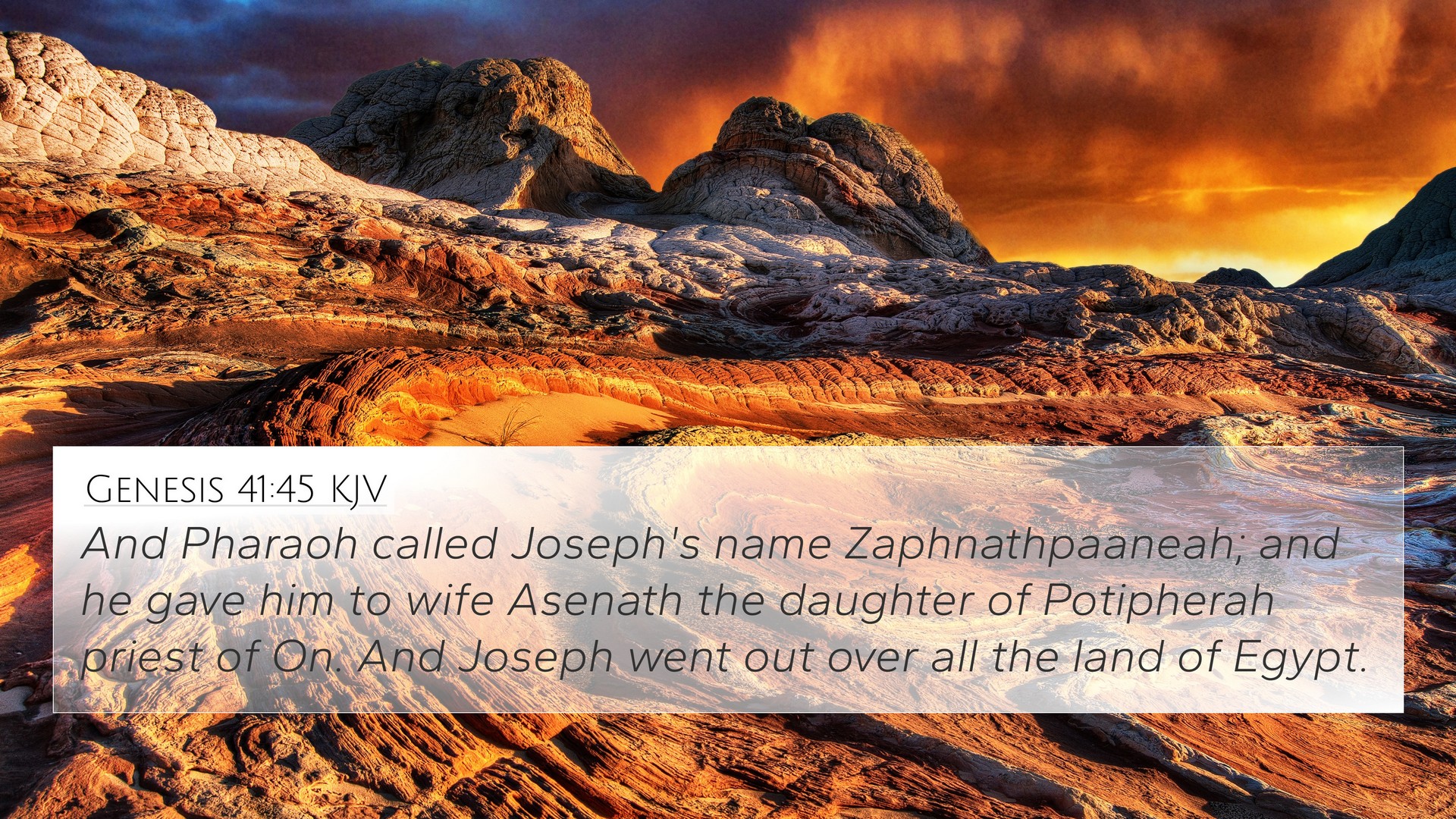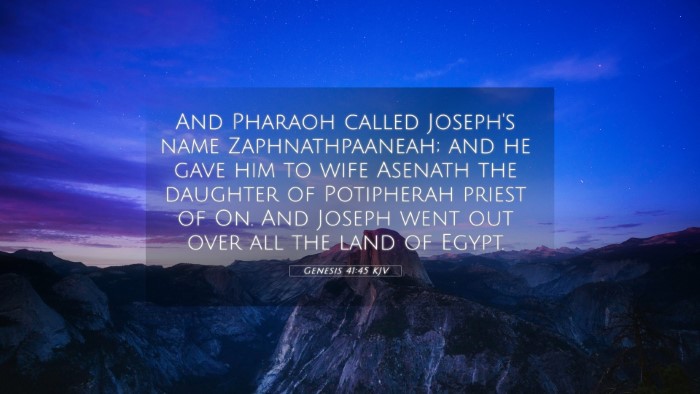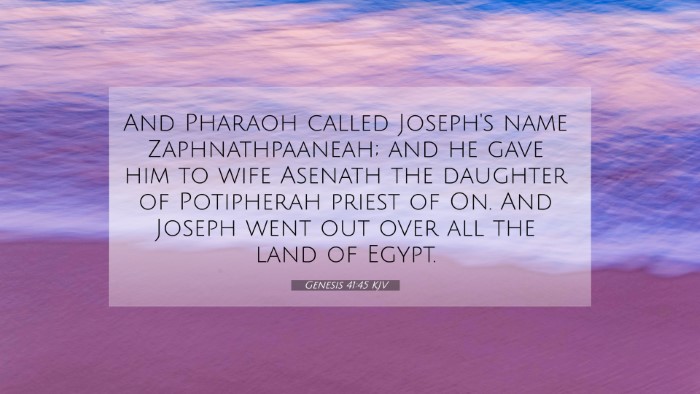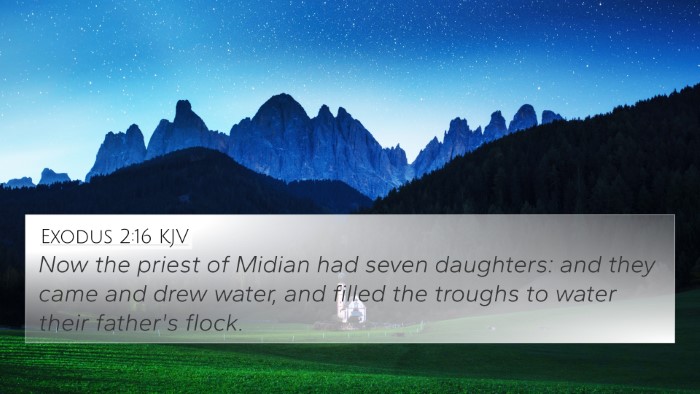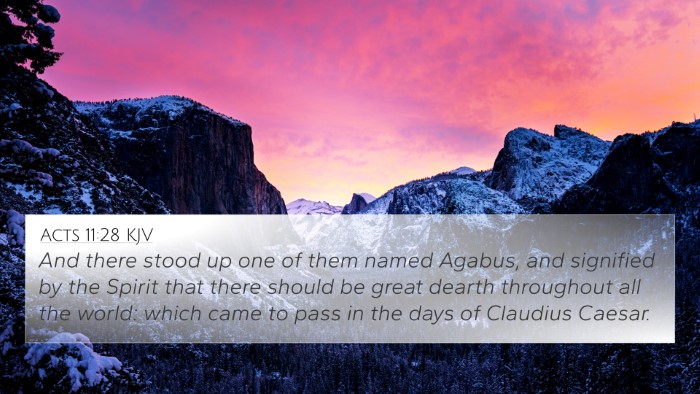Understanding Genesis 41:45
Genesis 41:45 states, “And Pharaoh called Joseph’s name Zaphnathpaaneah; and he gave him to wife Asenath the daughter of Potipherah priest of On. And Joseph went out over all the land of Egypt.” This verse marks a significant turning point in Joseph's life, highlighting themes of transformation, favor, and divine purpose.
Overview of the Verse
In Genesis 41:45, we see Pharaoh's bestowment of a new name upon Joseph, signifying his elevation to a position of authority in Egypt. The name Zaphnathpaaneah is believed to mean “the Savior of the World” or “the one who reveals secrets,” indicating Joseph's role as a visionary leader who interprets Pharaoh's dreams regarding the impending famine.
Thematic Connections
This verse is rich with thematic connections, linking various biblical concepts:
- Divine providence in establishing leadership (similar to 1 Samuel 16:12-13, where David is anointed king).
- The significance of names representing identity and purpose (echoing Isaiah 62:2, where names signify God's transformative work).
- Marriage alliances and their political implications (similar to Ruth 4:13-17, where Ruth's marriage to Boaz signifies redemption).
- The role of interpreters or wise men in governance (as seen in Daniel 2:46-49).
- The theme of restoration after trials (relating to Job 42:10-17, where Job’s fortunes are restored).
Insights from Commentaries
Matthew Henry
Henry emphasizes the importance of Joseph's new name, suggesting it reflects his new status and responsibility in Egypt. He states that this name signifies Joseph's role as an instrument through whom God saves nations.
Albert Barnes
Barnes notes that Zaphnathpaaneah may have roots in both Egyptian and Hebrew languages, indicating Joseph's significant bridging of cultures as he becomes a leader in a foreign land. Furthermore, he highlights Asenath's connection as the daughter of a priest, which reflects the merging of Jewish and Egyptian religious and political entities.
Adam Clarke
Clarke points out that Joseph's marriage to Asenath symbolizes his complete acceptance into Egyptian society and its system of governance. This union signifies both personal and political advancement, underlining God’s hand in orchestrating Joseph’s ascent.
Cross-References
Genesis 41:45 relates to several other scripture passages that provide deeper insight into its significance:
- Genesis 37:28: The initial betrayal of Joseph sets the stage for his journey to power.
- Genesis 39:1-4: Joseph’s time in Potiphar's house illustrates his resilience and God-given favor.
- Genesis 40:14-15: Joseph’s interpretation of dreams sets in motion the events leading to his elevation.
- Psalm 105:17-22: Reflects on how God sent Joseph ahead, further emphasizing divine purpose.
- Acts 7:9-10: Stephen recounts Joseph’s story, illustrating God’s providence in his journeys.
- Daniel 1:17: Highlights wisdom given by God to those in positions of authority, similar to Joseph's situation.
- Isaiah 1:26: The restoration theme can be connected through leadership that impacts a nation positively.
Conclusion
Genesis 41:45 encapsulates a transformational episode in Joseph's life, emphasizing the intersection of divine intervention and human agency. Understanding the implications of this verse, along with its thematic connections, enriches our grasp of Joseph’s story, and illustrates the overarching narrative of God's providence throughout the Bible.
